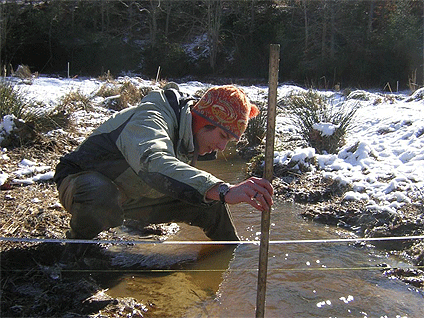

|
Graduate students
There are opportunities available in my lab to participate in research projects related to the ecology of large rivers, stream restoration and other topics. If you have an interest, please contact me and visit the graduate program Web page for the VCU Department of Biology Masters Program or the graduate program web page for the Integrated Life Sciences PhD Program. Current/Recent Students and their Projects: Laura Barry (MS 2009 Biology) – Zooplankton grazing in the James River. Result: there wasn’t any (<10% of Chlorophyll per day). What happens to all that algal production? Why aren’t there more zooplankton in the James River? Matt Beckwith (MS 2009 Biology) – Bacterial abundance in the tidal freshwater James River. Bacterial abundance increased in response to greater phytoplankton abundance suggesting that autochthonous sources of organic matter were important. Michael Brandt (MS 2009 Environmental Studies) – Benthic algal communities in sandy streams. Substrate stability was important in influencing biofilm development in streams of the Virginia Coastal Plain. Julie Frank (MS 2009 Biology) – Diel oxygen metabolism in streams of the Virginia Coastal Plain. Light levels were found to be a better predictor of autochthonous production than nutrient concentrations. William Isenberg (MS Environmental Studies) – Factors influencing amphipod abundance in the James River. Catherine Luria (MS 2010 Biology) – Bacterial responses to resource gradients in the tidal freshwater James River. RNA/DNA sequencing revealed that in the field many taxa become active in response to resource availability but in the lab, activation responses were limited to just a few taxa. Anne Schlegel (MS Biology) – Properties of suspended and sedimented particulate matter in the tidal freshwater James River. Molly Sobotka (MS Biology) – Sediment-nutrient interactions in a restored tidal creek.
Joe Wood (MS 2010 Biology) – Nitrogen retention in a recently restored tidal stream. Tidal exchange dominated fluxes which were highly sensitive to seasonal and event-based changes in water level of the James River. |
